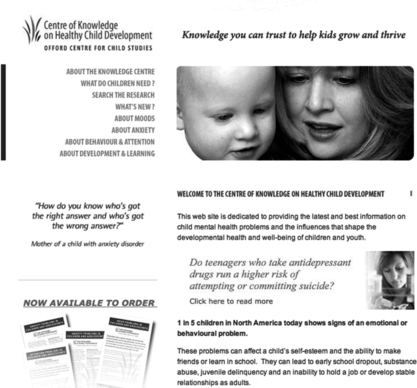ABSTRACT
The Centre of Knowledge on Healthy Child Development is an initiative launched in 2006 by the Offord Centre for Child Studies, a research center in Hamilton, Ontario, supported by McMaster University and McMaster Children's Hospital. Responding to concerns about the lack of practical, evidence-based information on child and youth mental health, the site aims to share the latest and best research on healthy child development and common mental health problems of children and youth so that parents, teachers, mental health clinicians and others can make better choices that will result in better outcomes for children.
“Knowledge you can trust to help kids grow and thrive.”
Founded in 1994 by Canadian child psychiatrist, Dr. David “Dan” Offord, the Offord Centre for Child Studies is recognized internationally as a leader in the study of factors that put children at risk of mental health and developmental problems. It is one of the few places in Canada where these problems are being tackled using the skill sets of many scientists from a broad range of disciplines.
In 2006, the Offord Centre created the Centre of Knowledge on Healthy Child Development in response to concerns expressed by its own researchers and others in the field that high-quality, evidence-based information on child and youth mental health was not finding its way into practice. The Web site (see Figure ) is dedicated to sharing the best and latest research about the factors that affect children's emotional, social, and cognitive development, along with expert advice on what parents, teachers, mental health clinicians, and others in the community can do to improve mental health outcomes for children and youth.
The site has been designed to focus on certain disorders, behavior problems and life circumstances that can have a significant impact on children's health and well-being. The design is clean and professional-looking; the site is easy to navigate; and information is logically organized under four main headings: “About Moods,” “About Anxiety,” “About Behaviour and Attention,” and “About Development and Learning.” Subheadings describe what the problem looks like (including how to distinguish between what is normal and what is not), how common it is, what causes it, how long it can last, and what treatments are effective. Users can access summaries of current, relevant research within the specific topic section, or go directly to “Search the Evidence” for an A-Z list of all the summaries by topic, a particularly useful feature.
These summaries form the mainstay of the site, and constitute its uniqueness as one of the few consumer health information Web sites dedicated to making the latest child and youth mental health research from around the world accessible to all Canadians. Literature searches are conducted weekly and summaries prepared by a research coordinator with input from at least one scientist with expertise in the topic. They are then edited by a communications specialist to ensure language is simple and easy to understand. Each summary is reviewed by an eight-member editorial board composed of researchers working in the field of early child development and child and youth mental health. All summaries are referenced with the authors' names, title, journal, and year and issue of publication, and describe the study methodology and significant findings. Key findings are excerpted and highlighted in “The Bottom Line,” which appears at the top of each summary. A glossary links users to definitions for any complex terminology that may appear within the articles.
Names and bios of editorial board members are provided in the “About the Knowledge Centre” section, which also describes the site's evidence-based approach to selecting, evaluating, and summarizing information. Because the Web site is as committed to prevention as it is to evidence-based treatment, a section called “What do children need?” talks about attachment, resilience, parenting styles, and other factors that promote healthy child development and well-being. Articles are written clearly, concisely, and without jargon, and resources for parents are geared toward practical strategies and solutions. A “What's New?” section is designed to help consumers understand new and recent research findings reported in the media and to know whether what they're reading and hearing is backed by real scientific evidence. A convenient feature is a Feedback option on each page of the Web site that allows users to submit questions and comments about an article as soon as it is read.
Through its Centre of Knowledge on Healthy Child Development Web site, the Offord Centre for Child Studies delivers high-quality, unbiased content based on the most current scientific evidence available, providing a valuable resource for parents, teachers, and others struggling to make sense of children's mental health problems. In the sea of conflicting information that exists on the Internet, it provides the real goods about what works and what doesn't when it comes to improving kids' emotional health and well-being. The site is still in its early stages of development, and plans to enrich the site include a parallel site for professionals and a service that would allow customized e-bulletins to be generated and delivered to groups of users based on their information preferences.
Additional information
Notes on contributors
Sherry Cecil
Sherry Cecil, BA ([email protected]) is Principal, Sherry Cecil & Associates, 1102 Jalna Boulevard, London, ON N6E 1X8 Canada.Notes
Comments and suggestions should be sent to the Column Editor: Susan Murray ([email protected]).
